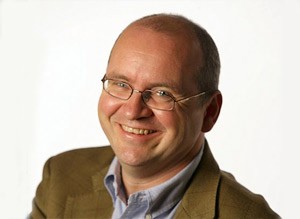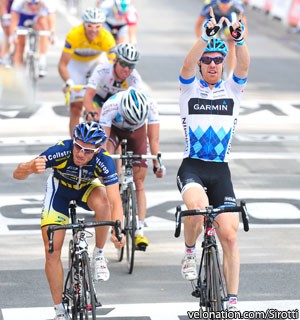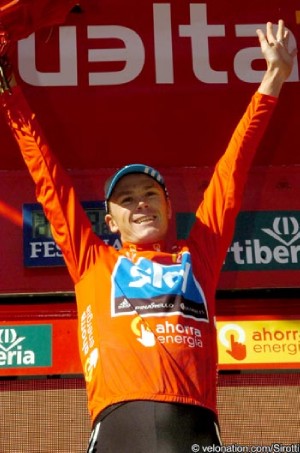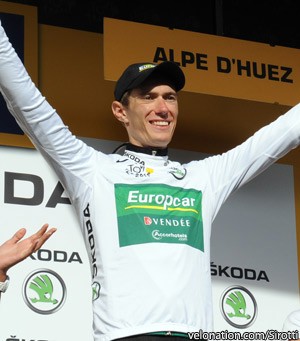Belgian gives his opinion on rider contracts, teams and more
 The autumn of 2010 was one of the most frantic ever in terms of the rider transfer market – Leopard brandished the chequebook, Garmin merged with Cervélo, Milram folded and then there there was the Pegasus debacle.
The autumn of 2010 was one of the most frantic ever in terms of the rider transfer market – Leopard brandished the chequebook, Garmin merged with Cervélo, Milram folded and then there there was the Pegasus debacle.
But the 2011 closed season looks set to top the frenzy of 12 months ago – there’s the Leopard/Shack merger, the QuickStep/Omega Pharma amalgamation, HTC Highroad ending, BMC waving the cheque book, Geox in trouble and Chris Froome being much in demand, and signing a major new contract with Sky Procycling.
To get a professional opinion on the state of the sport, VeloNation contacted Paul De Geyter of the Celio Sport and Image agency, who have some of the biggest riders in the sport on their roster.
VeloNation: How long have you been in the business, Mr. De Geyter?
Paul de Geyter: Almost fourteen years, I was originally a tax lawyer in Luxembourg with a lot of sports people as clients; I decided I could do more for them and began to give them advice on their contracts.
VN: Could you name some of your clients, please?
 PDG: Tyler Farrar, Matthew Goss, Michael Rogers, Adam Blythe, Ben Swift, Levi Leipheimer, Tom Boonen, Carlos Barredo, Stijn Devolder, Gerald Ciolek . . .
PDG: Tyler Farrar, Matthew Goss, Michael Rogers, Adam Blythe, Ben Swift, Levi Leipheimer, Tom Boonen, Carlos Barredo, Stijn Devolder, Gerald Ciolek . . .
VN: Is what’s happened to HTC a surprise to you?
PDG: It’s a disappointment – they should have been looking for a sponsor last year.
VN: Do you think that Bob Stapleton should have been shopping for a sponsor in Europe rather than the US?
PDG: I don’t know, he’s a smart guy and I’m sure he did what he had to do.
VN: The Shack/Leopard merger – what do you think?
PDG: It was a big surprise but it was apparent that there were problems when they couldn’t attract another sponsor – the investors weren’t going to go another year on their own. The merger isn’t a good thing, obviously – it means there’s one team less.
VN: With HTC folding and The Shack/Leopard merger, what’s the effect on the market?
PDG: It negatively affects the riders’ value in the market; there are 27 less places – the forming of Green Edge compensates for the loss of one team.
 It’s not the highest paid riders who suffer; they’re not still on the market come September. Froome was, but his performance in the Vuelta ensures a really good deal.
It’s not the highest paid riders who suffer; they’re not still on the market come September. Froome was, but his performance in the Vuelta ensures a really good deal.
VN: The rumour is that Sky is going to let go a lot of riders?
PDG: This is the end of their second year so there will be a lot of riders whose contracts expire, it’s logical that there will be an assessment and some riders won’t get new contracts.
VN: For 2012 it will be QuickStep/Omega Pharma and Lotto/Ridley – what do you think?
PDG: I think it would be better if the teams had remained as they were; my fear is that the Lotto team will be become much more international.
Lotto is a Belgian team, essentially – like Sky is a British team.
VN: What’s your take on teams like Leopard, where there’s so much reliance on one man’s money?
PDG: It’s not a new thing; to launch a team would be the plan of a single man; he would invest his own money and bring in sponsors.
What you have now is that you get investors and then try to bring in the sponsors – like Katusha or Garmin.
Maybe this trend will make the sport more professional – people like that hire the best people.
I think it’s a positive trend – but the danger is that the team is very much reliant on how one man feels.
VN: Will the rise of Marcel Kittel and Tony Martin bring pro cycling back to Germany?
PDG: The big problem in Germany is with the media and the doping situation – like we say in Belgium; ‘we’ll have to sweat it out!’
They need a guy who rides the road very well and can challenge for GC to get the interest back – the press will have no choice but to report it; and the sponsors will follow.
 VN: Will Voeckler and Rolland’s performances in the Tour have made it easier to get sponsors in France?
VN: Will Voeckler and Rolland’s performances in the Tour have made it easier to get sponsors in France?
PDG: Since Virenque there’s been no real star – the problem with French riders is that they tend to get paid too much, too quickly. Chavanel and Voeckler are good riders but they need a top guy – a hero for the media.
VN: Is ‘Mondialisation’ a good thing?
PDG: I think it’s a good thing but I think it’s at the expense of races in Belgium.
The Tour of Poland is a good race but it will never be a Belgian race, the UCI is cutting at the roots of the sport by investing so much time in mondialisation.
You cannot artificially create interest in races; it has to be ‘and’ not ‘or’ when it comes to the question of mondiale and European races – that’s where the sport was created. You cannot ignore European races.
VN: Tell us about your relationship with team managers…
PDG: I’ve been doing this for a few years – so you get respect.
The teams know that I have to work in my riders’ interests but in an honest way. We argue once or twice a year but in general we get along – up until today, anyway!
VN: What qualities do you require to see in a rider before you’ll take them on?
PDG: It has to be a rider who’s not on minimum wage – they don’t need us. You’re looking for someone who has potential and a good character; it’s easy when things are going well but when things are not going well you have to have riders with strength.
You also have to like the guy…if you’re going to go out and fight for him you have to be able to relate to him. But I’m not a fan of any of my riders – you can’t be objective if you are.
VN: What are your thoughts on the future of the sport?
PDG: I think it’s looking good. I’m hopeful, it’s more professional and it’s still a cheap sport for sponsors to come in to.
If there’s a financial crisis, a cycling team can survive because the teams cost less.
The sport isn’t growing, but it’s not diminishing – but if you look at football in 2011, there’s a lot less money around than there has been.